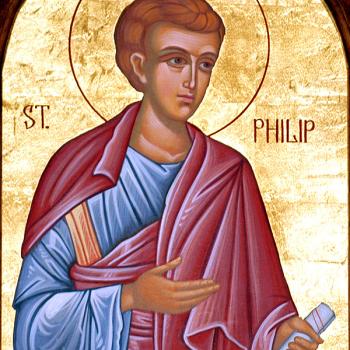J.R. Daniel Kirk is my second-favorite Kirk, and I am very pleased to welcome him here to Patheos.
Kirk’s blog, Storied Theology, brings another bona fide theologian to the line-up of bloggers here on the “progressive Christian channel.” That matters. I studied theology and I often write about it, but Dr. Kirk (Ph.D. in New Testament from Duke) brings more depth and insight to the subject.
Consider, for example, the positive theological case I’ve been making here for the past decade or so calling for the full equality of LGBT people in the church and in society. I’ve struggled to articulate that case based on the trajectory of Pentecost and the stories of Philip and Cornelius in the book of Acts, repeating that argument for years in a whole bunch of posts (a small chunk of which I remembered to tag with the designation “Acts 10”). It’s been encouraging to see others offer a similar argument — such as when influential British evangelical pastor Steve Chalke made this same theological case.
But Chalke is a pastor, not a theologian. So it was even more encouraging to read Kirk’s affirmation of this theological argument — providing a more solid grounding and illuminating aspects of this I hadn’t previously considered. See his posts “Embracing the Gentiles,” “Scripture and the Spirit of Christ,” and “Gentiles? Really?” Good stuff.
This is what I’ve really come to value in reading Kirk’s writing over the past several years. He’s often helped me to clarify, articulate, or fill in theological thoughts or suspicions I’d been gnawing at. When the NAE and the SBC recently sought to redefine “evangelicalism” by arguing that evangelicals regard the Bible as their “highest authority,” Kirk helped give words and shape to my sense that that was just … wrong:
The scriptures themselves paint a picture of Jesus who is more ultimate than those texts that attest to him, a Jesus who is more ultimate and the work and words of God that preceded him. That means that when we make scripture ultimate we should hear in its own voice the demand that it be given second place, that it retreat to the penultimate position, leaving Jesus (rather than scripture itself) as the final word.
I’m also very glad to see that Kirk didn’t land here at Patheos’ evangelical channel. Nothing against our friends over there, but there’s quite often a cautious, worried quality to theology that is intentionally written to be officially designated as “evangelical.” While he was still tethered to the evangelical Fuller Seminary, Kirk was an engaging, thoughtful writer and I enjoyed reading his blog. But his writing has gotten a lot more interesting — energized, invigorated, liberated — since the gatekeepers there invited him to, ahem, pursue other ministry opportunities. I get the sense, reading him now, that he’s been freed from the impossible task of having to write in a way that wouldn’t upset people who were intent on finding some pretext for being upset. That burden tends to make one’s writing both less truthful and less fun.
Those are good words to sum up what I’m trying to say here about my new Patheos colleague: truthful and fun.
The addition of Kirk’s Storied Theology follows the addition of the terrific line-up of contributors at Andre E. Johnson’s Rhetoric, Race & Religion blog. If this is the direction Patheos progressive Christian channel is headed, I’m going to need to up my game.

















